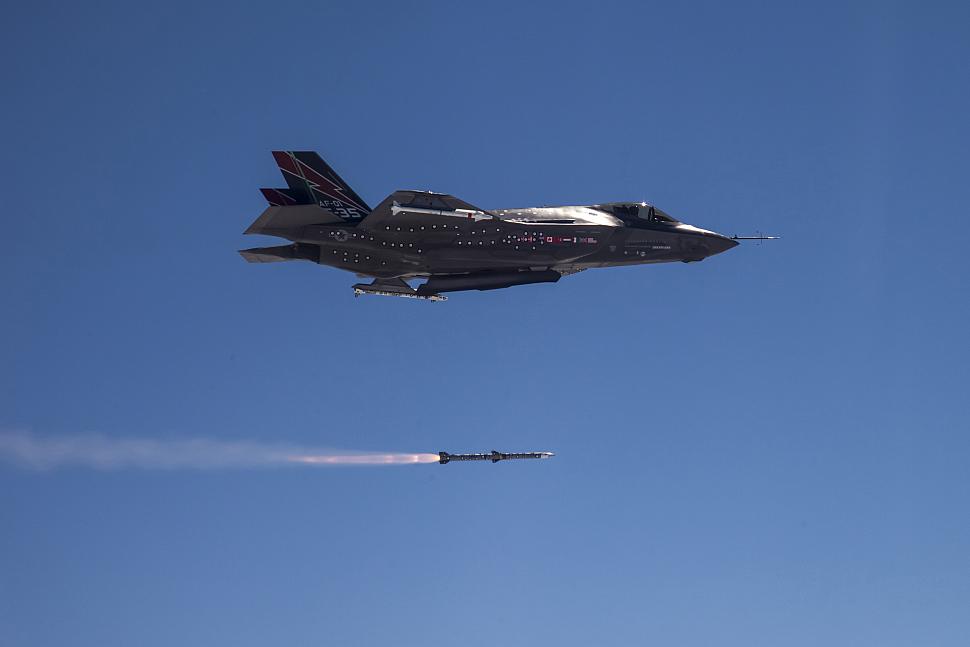Fighter Jet News
F-35 Lightning II News
F-35A completes 1st in-flight missile launch
June 6, 2013 (by
Asif Shamim) -
An F-35A conventional takeoff and landing aircraft completed the first in-flight missile launch of an AIM-120 over the Point Mugu Sea Test Range, June 5.

It was the first launch where the F-35 and AIM-120 demonstrated a successful launch-to-eject communications sequence and fired the rocket motor after launch -- paving the way for targeted launches in support of the Block 2B fleet release capability later this year.
The Air Force F-35A variant has seen significant development in training and operations recently including the beginning of pilot training at Eglin Air Force Base, Fla., the delivery of the first operational test aircraft to Edwards and Nellis Air Force Base, Nev., the first operational aerial refueling and the completion of high angle of attack testing.
"It's a testament to the entire military-industry test team," said Lt. Col. George "Boxer" Schwartz, F-35 Integrated Test Force director, who also piloted the flight. "They've worked thousands and thousands of hours to get to the point where we are today. It's fantastic to see that it's all paid off. We're rolling into a lot of additional weapons work in the coming months to put that expanded capability on the aircraft."
The F-35A 5th Generation fighter is designed to carry a payload of up to 18,000 pounds using 10 weapon stations. The F-35A features four internal weapon stations located in two weapon bays to maximize stealth capability. The CTOL aircraft can also utilize an additional three external weapon stations per wing if required.
The U.S. Air Force has established an F-35A initial operating capability target date of December 2016. By this date, the Air Force will have fielded an operational squadron with at least 12 aircraft along with Airmen trained and equipped to conduct basic close air support, interdiction and limited suppression, and destruction of enemy air defense operations in a contested environment.
Moving into the active phase of weapons test is another large step toward delivering Block 2B software capability that will enable initial combat deployment.
"We've spent years working on the design of the aircraft, and many months ensuring that weapons could be contained within the aircraft and dropped as designed," said Charlie Wagner, F-35 weapons director. "This event is the result of tremendous effort and collaboration in the F-35 Enterprise, and marks a turning point in F-35 capabilities; the AIM-120 launch is one small but critical increment toward proving combat capability,"
The 5th generation F-35 Lightning II combines advanced stealth with fighter speed and agility, fully fused sensor information, network-enabled operations and advanced sustainment. Three distinct variants of the F-35 will replace the A-10 and F-16 for the U.S. Air Force, the F/A-18 for the U.S. Navy, the F/A-18 and AV-8B Harrier for the U.S. Marine Corps, and a variety of fighters for other countries.

Lt.Col. George 'Boxer' Schwartz flies F-35A AF-01 conventional take-off and landing aircraft during the first in-flight missile launch of an AIM-120 over the Point Mugu Sea test range on June 5th, 2013. [Lockheed photo]
The Air Force F-35A variant has seen significant development in training and operations recently including the beginning of pilot training at Eglin Air Force Base, Fla., the delivery of the first operational test aircraft to Edwards and Nellis Air Force Base, Nev., the first operational aerial refueling and the completion of high angle of attack testing.
"It's a testament to the entire military-industry test team," said Lt. Col. George "Boxer" Schwartz, F-35 Integrated Test Force director, who also piloted the flight. "They've worked thousands and thousands of hours to get to the point where we are today. It's fantastic to see that it's all paid off. We're rolling into a lot of additional weapons work in the coming months to put that expanded capability on the aircraft."
The F-35A 5th Generation fighter is designed to carry a payload of up to 18,000 pounds using 10 weapon stations. The F-35A features four internal weapon stations located in two weapon bays to maximize stealth capability. The CTOL aircraft can also utilize an additional three external weapon stations per wing if required.
The U.S. Air Force has established an F-35A initial operating capability target date of December 2016. By this date, the Air Force will have fielded an operational squadron with at least 12 aircraft along with Airmen trained and equipped to conduct basic close air support, interdiction and limited suppression, and destruction of enemy air defense operations in a contested environment.
Moving into the active phase of weapons test is another large step toward delivering Block 2B software capability that will enable initial combat deployment.
"We've spent years working on the design of the aircraft, and many months ensuring that weapons could be contained within the aircraft and dropped as designed," said Charlie Wagner, F-35 weapons director. "This event is the result of tremendous effort and collaboration in the F-35 Enterprise, and marks a turning point in F-35 capabilities; the AIM-120 launch is one small but critical increment toward proving combat capability,"
The 5th generation F-35 Lightning II combines advanced stealth with fighter speed and agility, fully fused sensor information, network-enabled operations and advanced sustainment. Three distinct variants of the F-35 will replace the A-10 and F-16 for the U.S. Air Force, the F/A-18 for the U.S. Navy, the F/A-18 and AV-8B Harrier for the U.S. Marine Corps, and a variety of fighters for other countries.
Courtesy F-35 Program Office
Related articles:
Forum discussion:
Tags
- F-35 completes first aerial AMRAAM weapons release ( 2012-10-22)
- F-35A completes first in-flight JDAM release ( 2012-10-17)
- F-35 completes first airborne weapons separation ( 2012-08-08)
- Meteor Missile will make changes to accommodate F-35 ( 2005-06-03)
- F-35 Lightning II news archive
Forum discussion:
- F-35A completes 1st in-flight missile launch ( 19 replies)
Tags
